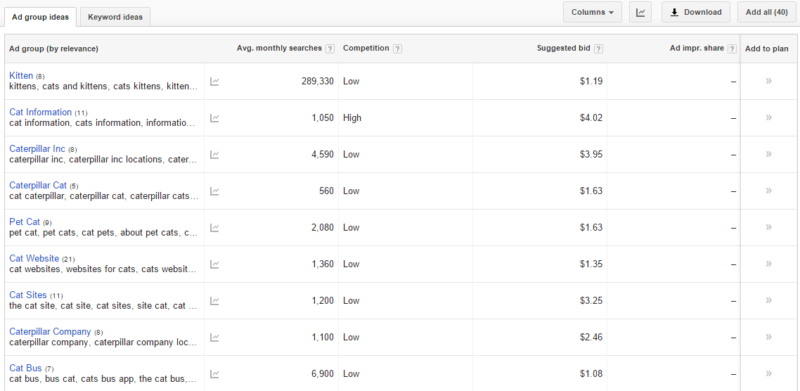How to find relevant and proof terms for your content
Quality content is great, but it won't improve your SEO if it's not based on solid keyword research. Columnist Jayson DeMers shares his tips for focusing your content on the right keywords.

The worlds of content marketing and SEO are constantly changing, and it can be difficult to keep up. If you’re like many business owners, you may find that all that costly and time-consuming content you’re creating just isn’t getting the search visibility you believe it deserves.
Two new terms you may be hearing more about are “relevant” and “proof” terms. In their 2015 Ranking Factors report, Searchmetrics looked at top-ranking sites to see which factors were important for ranking, specifically in Google; two factors that were revealed to be integral were relevant and proof terms.
Finding: The highest-ranking pages contained a 53-percent proportion of relevant terms.
Relevant keywords are ones that suggest to Google that you’re providing comprehensive coverage of a topic. For example, if I were writing about the iPhone, I’d probably naturally use words throughout my article such as “technology,” “apps” and “iOS.” From scanning billions of other pages on the internet, many of which focus on the iPhone, Google knows what related words are most likely to appear in an article about iPhones. So using such words essentially shows Google that I’m providing a sufficient breadth of information related to my main theme.
Finding: The highest-ranking pages contained a 78-percent proportion of proof terms.
Proof terms, on the other hand, are words or phrases that must be used when discussing a particular topic. Using the example above, these might be words like “phone,” “Apple,” and perhaps “mobile.” These words or phrases essentially prove to Google that I’m actually covering the topic at hand.
It’s essential to use relevant and proof terms on a page to attain high search rankings for any given keyword. But how do you go about finding and incorporating these keywords into your content? The good news is that it’s probably easier than you think. This post will walk you through the process.
Keep in mind that isolating and identifying specific proof terms can be difficult, as there is no standard list or set you can use as a reference. Much of this process will be speculative and will rely on your own research skills and in-depth knowledge of the topic you’re covering.
1. Use keyword tools
Related keywords could be synonyms or variations, or they could be words or phrases that are commonly used alongside your primary keyword. For instance, using a primary keyword like “cat,” we could identify a number of related and/or proof terms, such as:
- feline (synonym);
- cats (variation);
- collar (sub-topic);
- kitten (synonym);
- cat breeds (sub-topic); and
- bengal (sub-topic).
Virtually any keyword tool will allow you to identify related terms. Google’s Keyword Planner is a great place to start. After plugging in your primary keyword, you can browse through the Keyword ideas tab; however, I prefer to use the “Ad group ideas” tab to find more specific words and phrases. Once you’ve identified a sub-topic you want to pursue, you can click on the phrase to drill down even further to find more related terms.
Ubersuggest is another great tool that can provide you with thousands of related keyword suggestions. Because the sheer volume of results can be rather overwhelming, I suggest entering a more specific multi-word phrase to find the most relevant suggestions. Ubersuggest allows you to choose whether you’d like to search the entire web, images, news, shopping, videos or recipes.
Use your relevant keywords to create sub-topics and sub-headings for your content. This will not only help you structure your content more efficiently, it will also provide additional SEO benefits when you use them in your heading tags (H1, H2 and so on).
2. Use Google’s “Searches related to” feature
If you want to see which words and phrases Google feels are semantically related to your primary keyword, this is a great strategy. Simply use your keyword in a search query, and then scroll down to the bottom of the page to see the “Searches related to” results.
You can also use Google’s autocomplete feature to see which words and phrases are typically queried in relation to your keyword. Keep in mind that these results may be impacted by relevant searches you’ve performed in the past (if you’re signed in to your Google account).
3. Identify words and phrases top-ranking pages are using
Since we already know that high-ranking pages contain a high proportion of relevant and proof terms, it makes sense to gain insights directly from the winners. Identify the top-ranking pages for your keyword, and then see which words and phrases are being used (besides your primary keyword).
This can be a difficult process to perform manually, but there are some tools that can help. SEO Book’s Keyword Density Analyzer can show you exactly which words are used on a page and how often. It will tell you which words and phrases are used both in the content of the page and in the metadata.
4. Low-tech brainstorming
There’s a chance that even after using the strategies above, you may be missing out on some important related and proof terms. Ask yourself which words or phrases you would use to find information related to the topic. What variations might you use? What sub-topics would provide useful insights into the main topic? What words or phrases are intimately related to your primary topic?
Visiting industry forums can also clue you in to important keywords. See what questions are being asked and which topics are frequently referenced in relation to your keyword. Visit popular blogs in your niche to see which topics they frequently cover. Look at their high-ranking posts to see which words or phrases are frequently used in regard to your topic (Use the strategy outlined in #3).
5. Creating comprehensive content will naturally lead you to include relevant and proof terms
While the tools and strategies above will certainly work to provide you with many relevant and proof terms, there’s another strategy that’s just as effective and perhaps even easier to implement. By focusing on creating long-form, comprehensive content, you will naturally incorporate many relevant and proof terms.
While the strategies above can give you important insights into topics and keywords you can use, there’s no substitute for creating content that covers every angle of a topic.
Creating this type of comprehensive content will necessitate using two main strategies: First, make sure your content is long enough to sufficiently cover the topic. The Searchmetrics study found that the top-ranking pages contained an average of 1,285 words. Second, focus on creating holistic content. This is more a mindset than a specific strategy. Essentially, it requires that you focus on expanding your topic to include all the relevant information your readers will want.
As the report authors point out, focusing only on keywords will only get you so far: “Focusing your optimization on single keywords or keyword lists without providing truly relevant content for the user will not result in long-term success.”
Writing holistic, comprehensive content, on the other hand, will naturally incorporate many/most of your relevant and proof terms and will be far more likely to result in high rankings over the long term. Just be sure not to approach the realm of keyword stuffing.
Conclusion
As you can see, there’s no cut-and-dried way to find proof and relevant terms, or at least no way to definitively know which ones Google wants to see.
However, by using keyword tools and insights from Google, seeing which words and phrases top-ranking pages are using and focusing on creating comprehensive content, you’re well on your way to providing information that both Google and your readers will love.
Contributing authors are invited to create content for Search Engine Land and are chosen for their expertise and contribution to the search community. Our contributors work under the oversight of the editorial staff and contributions are checked for quality and relevance to our readers. The opinions they express are their own.
Related stories



